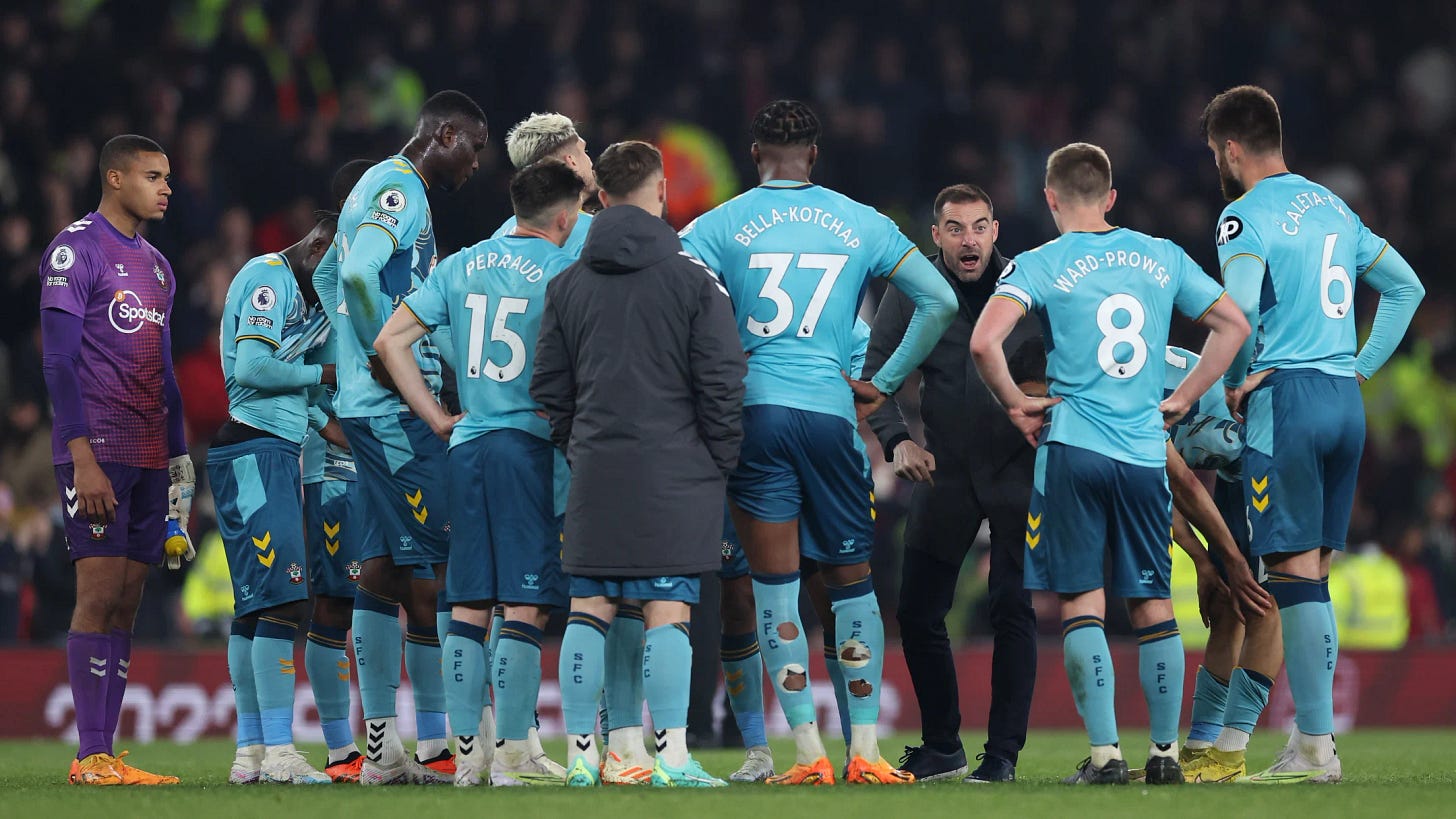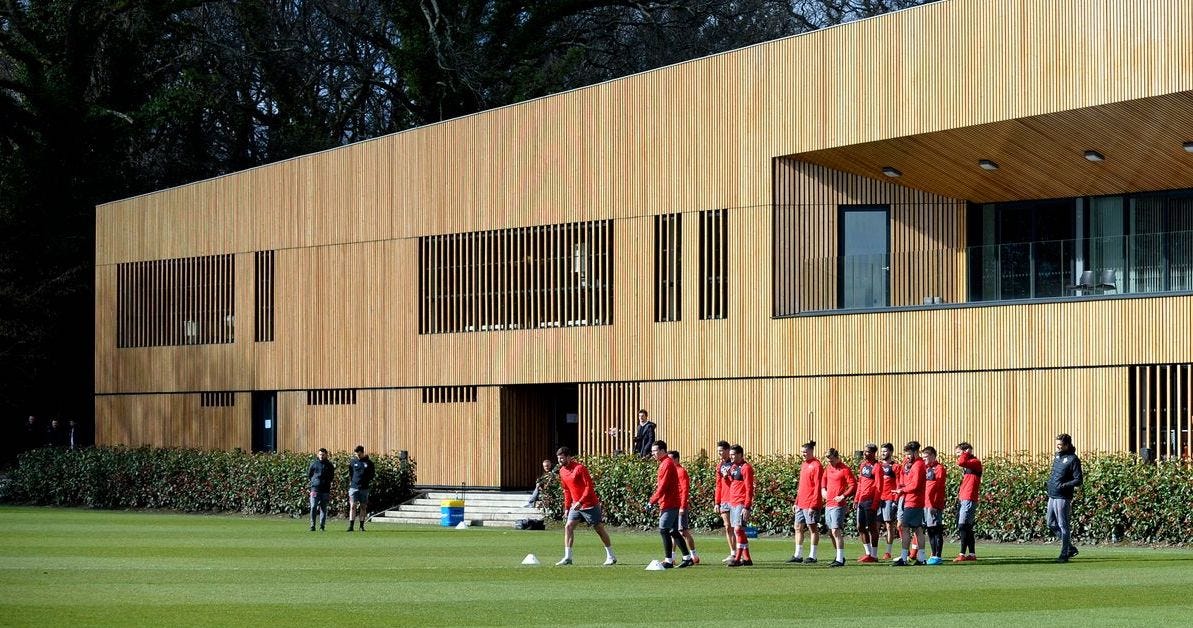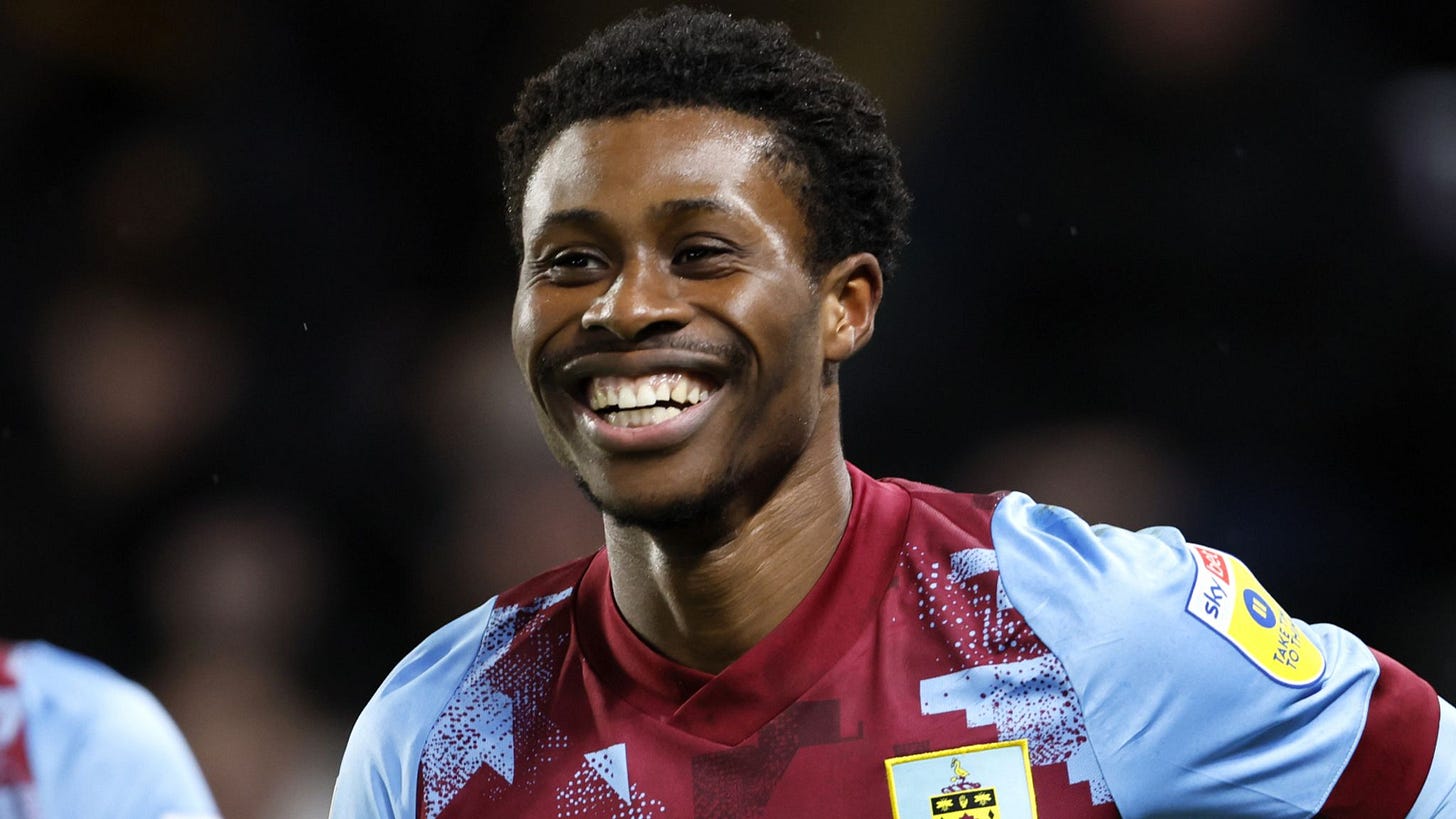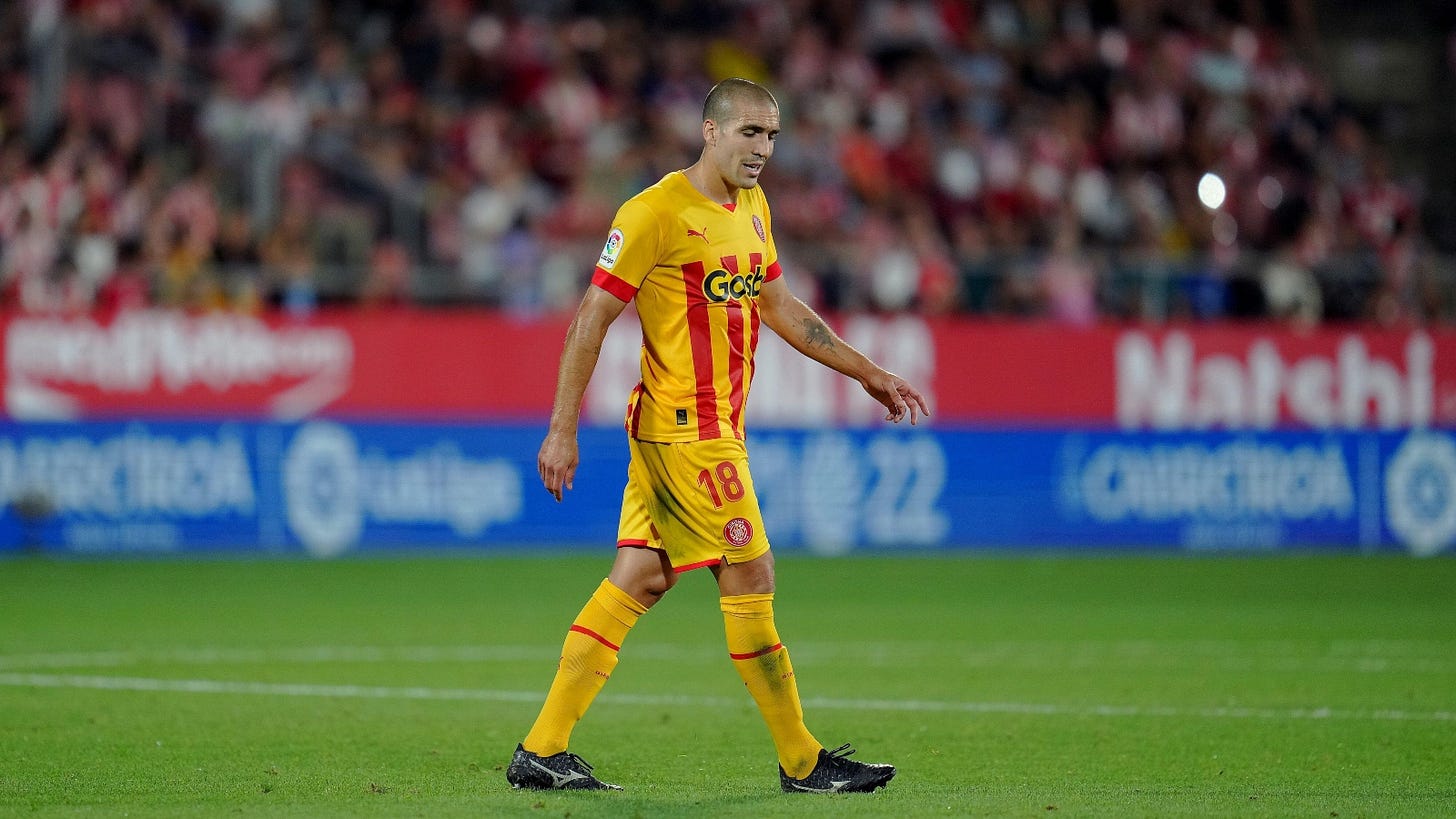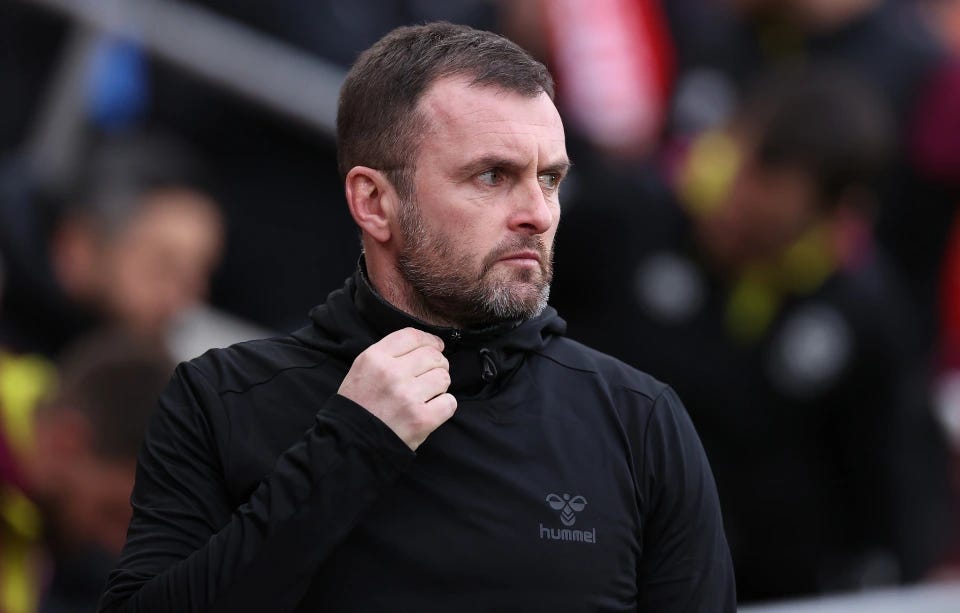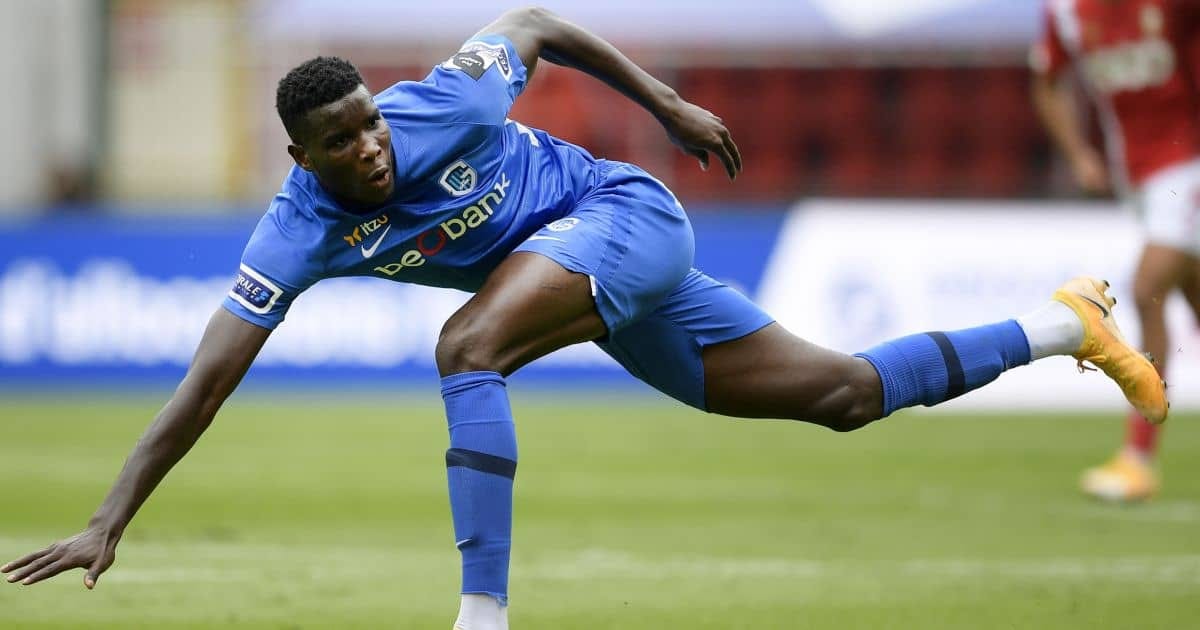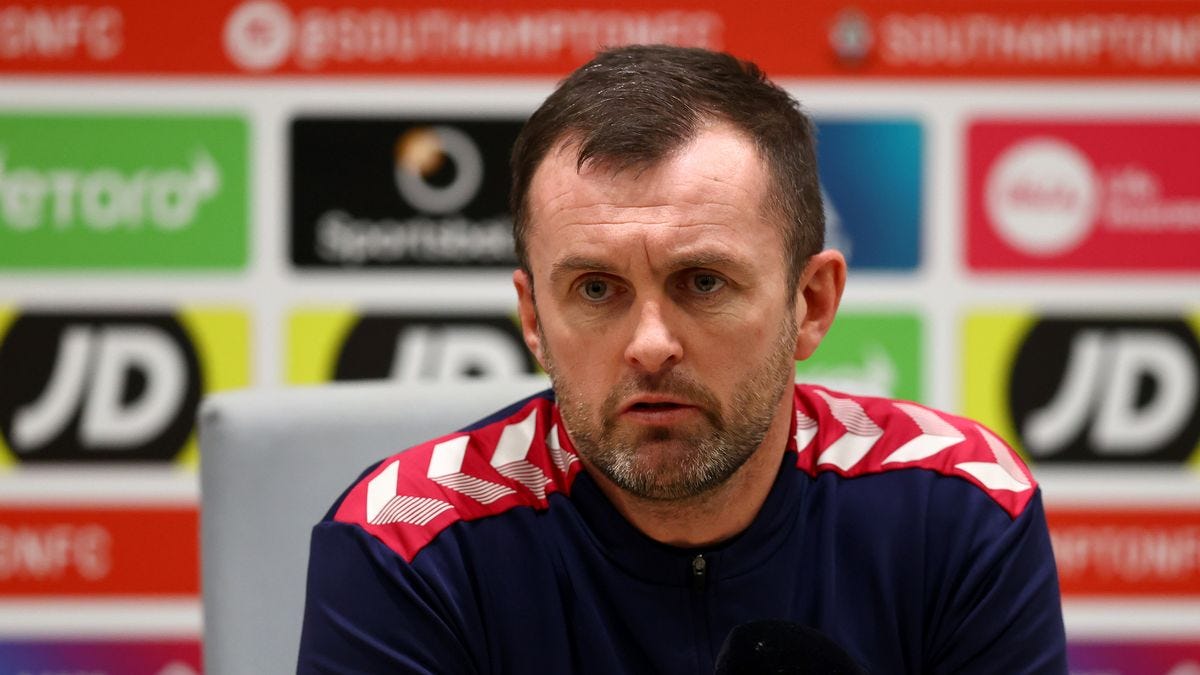11 exits on the 'Pompey Highway'
Reviewing all the opportunities Saints had to stay up.
Crystal Palace is where I called it, personally. The day the lights went out completely. I’ve read much since that weekend trying to place where it all went wrong. Put a finger on the big mistake that led us to this point. Most of it has been pretty good and I’ve not really had anything to add. I didn’t much care to write an ‘autopsy’ piece either.
Truthfully, I’ve found it hard to pin down one singular reason. There is a Portsmouth fan, Luke Moore, on a popular football podcast, who often describes clubs that are in a spiral or otherwise on the road to nowhere as travelling down the “Pompey Highway”. I like this metaphor for obvious reasons, but also because it suggests an better way to frame how Southampton got to this point than trying a identify a single, decisive mistake. A highway is a road that can take you a great distance in one direction but with many exits. It’s less that Southampton made one big mistake, but missed many opportunities to get off the highway. Some are big, others small. Some of the mistakes could even have been successes, had other off-ramps been taken. Accepting this has been helpful for me in getting a handle on what we did wrong.
So I thought I’d use the frame to write my autopsy piece in a slightly different way.
Exit by exit, let me take you down the Pompey Highway.
In my head, the Pompey Highway looks like M3 and you slide down it from London. Not far off really. The only problem is deciding where it starts. If we really wanted, I could go much further back. We could talk about Marcus, Cortese, Les Reed, Katerina, Gao, Ross Wilson’s horror signings. Do a whole inquest about “the Southampton Way”, whatever the hell that was. But this article will probably be long as it is and I have to call it somewhere. So we’re starting with Danny Ings.
Exit 1: Not selling Danny Ings
It’s a controversial place to start and the source of much nostalgia. The absence of a productive striker since Ings’ departure is the biggest single factor in our relegation, a gaping and persistent hole in the squad. Perhaps that’s why I’ve started here. But I don’t think we should have come off at this junction.
It needs to be restated what position the club was in, in summer 2021, our most dangerous and delicate transfer window since the 2014 firesale. Still crippled by the expensive failed signings of 2016-18, the club had no profits to reinvest in a tired and bloated squad and Gao was nowhere to be seen. In that context, Villa and Leicester offered a combined £37m for our best player and best CB: aging, injury-prone, assets with a year each left on their deals. The club walked a tightrope between selling them and getting relegated immediately, or sitting on their hands and getting relegated in a season or two, with no money, after Ings and Vestergaard left as free agents.
We rolled the dice, and picked up Livramento, Salisu, Perraud, Armstrong, Diallo and Lyanco. A mixed bag to be sure, but I think it was the right decision to try and rebuild the spine, invest in youth, and give us a fighting chance to survive seasons to come. That season ended very poorly, but we stayed up, without it ever really getting dicey, and I think most people felt that we were looking up the table next season, not down.
Obviously, it’s therefore a terrible irony that we failed to capitalise on the time we bought ourselves, especially after Sport Republic arrived and solved the investment issue anyway. I don’t think Semmens and Crocker are at fault here. It was on them to prepare for the future as far as was foreseeable. That brings us neatly onto exit two, and what we did last summer…
Exit 2: Signing an attacker in summer
For a long time, I argued that we didn’t need a new striker as much as we needed new wide players to feed them. I was wrong about this — we need both. But hell, with a couple of solid wingers who knows, maybe we scrape 16th/17th? Bottom line, we needed a goalscorer.
This is the biggest off-ramp insofar as it makes the biggest contribution to staying up regardless of whatever other exits we take. If we sign a good forward in the summer, it’s feasible we survive without Ralph, or without even properly fixing the attack. As it was with Danny Ings, you can imagine a Saints team that are painful to watch most of the time, but the talisman-carry-player does enough for us, often enough, to scrape through. I’d go as far as to say that maybe, we even survive Nathan Jones, with a good enough forward.
Eventually though, I think Ralphdom comes crumbling down either way, all those relationships worn thin. So it’s not a sure fix, and definitely a short one.
Exit 3: Signing more experience
The best short account of Saints relegation I’ve seen is Lucy Highnett’s argument that Sport Republic failed to respect the task of staying in the Premier League, by privileging their long-term strategy of buying young, raw assets that could be developed over experienced players that could have keep us in the league this season.
Without undermining my whole exits-not-reasons framing, this is about as nailed on as I think it gets. If I’m being really pedantic, I’d stress that it’s not so much youth/experience per se, as Premier League-readiness more broadly. Lots of half-watching TV pundits have said that buying so many young players has killed us. But in reality it is the new kids (Lavia, Bella-Kotchap and Edozie) that have been our strongest performers this season. Meanwhile experienced players Walcott, Stuie, Adam Armstrong, Elyounoussi, Oršić, Onuachu, Aribo (and to some extent) Che Adams have contributed very little.
This is why Lucy’s take is so sensical, because the core feature of Sport Republic’s strategy, buying young and buying smart, has been largely successful — it’s just the blind, unwavering overreliance on it that has proven fatal.
Exit 4: Not loaning out Stephens, Tella or Bednarek
Nope, nope, nope.
I’ll admit to being totally blindsided by the Bednaissance. And I’m really happy Jack Stephens is having a good time, a very lovable, imperfect player. But let’s not be goldfish about the Bednarek-Stephens partnership, a very long and testing fixture in Saints’ recent history. Both players are probably much improved next to Bella-Kotchap, but neither help us avoid relegation, and our problems are deeper than individuals anyway. Even with ABK and Salisu lining up fit, our two best CBs, Saints have struggled with elementary defensive competencies, particularly set plays and crosses.
The Tella question is more interesting.
Nobody is more pleased than me to see Tella killing it at Burnley, and nobody is sadder to see him leave without showing his true colours in a striped shirt. But Southampton’s attacking problems run much deeper than the power of Nathan Tella to solve. Let’s suppose that Tella is capable next season of maintaining numbers not too far short of what he’s achieved in the Championship (17 goals, all comps). Ralph limited Tella’s minutes because he felt he didn’t have the competencies for his ‘ball-oriented’ pressing game. Perhaps there was a way to accommodate him, but that challenge of solving the mismatch between personnel and the system has gone unsolved all season. Edozie, Onuachu, Aribo, Sulemana, Ćaleta-Car and (maybe) Oršić are all talented players, but successive managers have failed to integrate any of them. It’s hard to see why they would have succeeded with Tella.
I guess my big reflection here is not that Tella could have saved Saints, but that maybe a model of football so narrow and fussy that it couldn’t be adapted to accommodate Tella’s talent eventually killed us. Put another way, if you have top attacking talent coming out of your academy, and they can’t fit into your system but you have the worst attack in the league, maybe it’s, you know… the system that's the problem?
When we go down, I can’t wait to play football where players like Tella, with pace, vision, nerve and finishing skills, are celebrated for it, rather punished for not being ‘ball-oriented’.
Honourable mention: Exit 4a, Not loaning out Will Smallbone. I don’t think this one is worth considering. But similarly to Tella, he has spoken to The Athletic about how our system didn’t suit him. Pleased he’s had a good time at Stoke, excited to see him next season.
Exit 5: Not selling Romeu
Selling Romeu was a relatively small risk, of which we took a few too many in the summer. It doesn’t take us too far down the Pompey Highway and shouldn’t have been fatal had we taken another exit.
But we didn’t. We took all the risks. And in the period after Lavia’s injury against Chelsea the gap at the no. 6 was excruciating. Diallo couldn’t protect the backline, and Ward-Prowse was pulled away from the offensive contribution he could have made further up. Certainly cost us vital points and what could still be a close run battle for 17th (for others). The path from Lavia’s injury to Ralph’s sacking is short and straight, so you can at least wonder.
Definitely not the reason, but with my tin foil hat on, maybe a domino?
Honourable mention: Exit 5a, Not selling Nathan Redmond. If he stays, he ends up in Walcott’s role of being our most-creditable-but-ultimately-useless wide player. Gave us many years of service and I’m glad he’s moved on to greener pastures.
Exit 6: Not sacking Ralph
Naturally this is taking up the most attention. I don’t feel comfortable calling this one as decisively as the other exits, as if I could have the final word on what is a live and raw debate for lots of fans.
Instead I’ll say that I was a soft #RalphIn until the end. My feeling at the time was that he might just have scraped 17th, again, but as the season has unravelled I’ve actually become less confident he could have done it again. I really liked him personally.
I can’t bring myself to criticise Sport Republic for sacking him. First, the fraught, angry, tired sentiment toward Ralph’s regime at the end just wasn’t sustainable. Let’s assume he had just enough left in the tank personally to keep us up, circumstances aside. Even then, it would have been another long, painful season of fits and starts, flitting between a clear identity and missing-in-action. A truly toxic dressing room. A misfiring team would have been accompanied by a very real threat of relegation, all season. The atmosphere would have been vitriolic. A good board should have the courage to stand up fans if they believe it is truly best for the club, but to withstand the siege that would have accompanied backing Hassenhuttl all the way to May — I just couldn’t expect that.
Second, the Nathan Jones debacle has given some people a more positive outlook on Ralph. But since the arrival of Sellés, I feel less confident Ralph could have succeeded. It is widely understood that a fatal problem for Ralph was a major breakdown in relationships and team morale. After Jones, Sellés essentially reverted to maximally Ralphy style of play, but boosted by a fresh face, charismatic leadership, some home truths, a disciplinary reset and a tactical identity so clear you could walk into it. A comprehensive new manager bounce. But though for a while this brought back the best of Ralphball, in time it also brought back the worst. Sellés has failed to solve the systemic issues that Ralph never did. And if Sexy Ruben Sellés can’t make Ralphball work in a healthy environment with £60m of reinforcements, I don’t see how Ralph succeeds in a toxic one.
Exit 7: Not hiring Nathan Jones
You will be unsurprised to learn that I think relegation could have been avoided by hiring a manager who was not Nathan Jones.
Confession time again though: I was willing to back him, grudgingly, right until the Wolves defeat. I wanted it to work so badly, and felt we couldn’t afford for not to. I will say that I thought much criticism of Jones was heightened by prejudice against managers from the Championship, and managers that aren't sufficiently continental, both of which are poor proxies for actual ability. So I waited for the fruits of his ability to come good. I also felt it was the kind of tactical paradigm shift change that would come with a difficult adjustment phase rather than a new manager bounce.
So yeah, definitely a big exit missed. Up there with Exit 2 (striker in the summer). But this one in fairness was especially difficult to navigate. A manager is the most consequential hire a club can make and also the most unpredictable. I'm not surprised it melted Rasmus' shiny data model. He's probably still in Task Manager right now trying to close Excel. On the Pompey Highway, picking a new manager is Spaghetti Junction.
Exit 8: January…
Best deadline day in years. Wild.
It is a big exit missed, but one that depends heavily on others.
First off, I don’t think we signed objectively bad players. Oršić is the only clear failure and it was a cheap and opportunistic transfer. Sulemana has looked decent in the same position without making the difference we needed. You get the sense he could be great with better direction, and that’s the real problem: we still don’t really have a idea of how to use these players to break teams down. Tall Paul can’t be judged and Charly Alcaraz is a straight baller.
If there’s a missed exit here, it’s probably not that we signed poor players, but that we signed players for Nathan Jones then sacked him two games after deadline day. Which in turn begs the question…
Exit 9: Sacking Jones earlier?
Yes.
In the end, sure. Despite losing every league match in 2023 against the bottom bar Leicester, we were only cut adrift right at the end. At the time, I thought it was Jones or bust. But clearly there was more hope for another spin of the wheel than I realised.
Most fans were way ahead of me on this one. The board were not.
Of course, this exit only counts if you pick the right replacement.
Exit 10: Not hiring Selles
Having signed all those players for Jones, should we have hired Sellés, a manager with a more Ralphy philosophy than Ralph?
The reason I like the highway frame so much is that decisions like these all look so reasonable in isolation but when you join all the dots together and you see the trainwreck of this season as a whole, it’s like an Escher painting. Sellés did so much genuine good for the team when he stepped up, and after the Chelsea game I think the hope was truly justified. Ralph’s tenure collapsed because of a breakdown in relationships, so it wasn’t unreasonable to think that someone with the same ideas who was internally well-regarded throughout the club and was liked and respected by the squad, was the right guy. In hindsight, that he would bring the worst aspects of Ralphball back with the best aspects seems as predictable as the rain.
Even more tactically stubborn than Ralph, but chances are he’s a solid coach in the right setting and has a great managerial career ahead of him, elsewhere. Best of luck.
Honourable mention: Exit 10a, Hiring Jesse Marsch. Good coach, but fail to see how the only manager around as similar to Ralph as Sellés is successful, for all the same reasons. Maybe.
Exit 11: Sacking Selles?
Perhaps the strangest thing about this relegation battle is how many exits we missed without totally closing the door. When we almost went down in 2018, my gut feeling is that the fight then was harder, we did more to arrest the slide, and even then it still came down to a lucky knifefight in South Wales. Not only have we completely bottled this relegation fight, we’ve bottled one of the easiest fights in years. So many vulnerable teams asking to go down, so much for the magical 40pt mark. As I write this, Leicester City are in 16th place and mathematically they cannot earn more than 39pts (played 35). Yet we have conspired to be the worst. To top it off, I actually feel we have a better group of players than 2018.
For that reason, you have to grudgingly consider the possibility that even having missed all those exits, we could have replaced Ruben Sellés and made a Hail Mary hire to save the season, like 2018. I mean who knows, perhaps Mark Hughes still has the same number.
Realistically, I think we would have needed to sack Sellés before West Ham away (28 played, 23pts) to have even a remote hope of this, and at that time his failings weren’t so obvious. I don’t think the board could reasonably be expected to have made this call.
But then, if there’s one thing I’ve learnt writing this article, it’s that I’d have made most of the same decisions they did at the time and got the club relegated too, so what do I know? Fittingly, I’m finishing this piece at 6pm after the Fulham game, and we are now mathematically relegated. Like the Pompey Highway, it’s a long post — the longest I’ve written by far. Now that it’s over, I’m just glad that in my first season of writing about Southampton FC, I just post my shitty takes on the internet, and I don’t have to run a football club about which I care very deeply.
We should get some rest, then march on.


